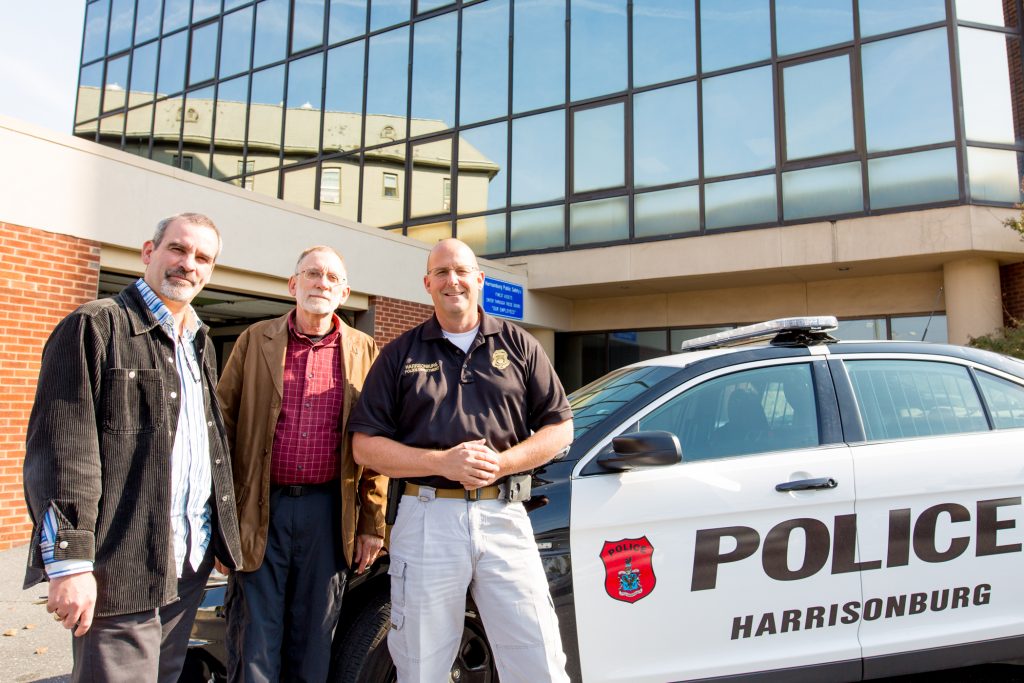Representatives from 10 police departments across the country will attend a law enforcement retreat on restorative justice Nov. 11-13 near Harrisonburg, Virginia. The retreat is co-hosted by the Harrisonburg (Virginia) Police Department and the Zehr Institute for Restorative Justice, a program of the Center for Justice and Peacebuilding at Eastern Mennonite University.
The goal of the retreat is to build networks, share resources, and gain insight into best practices, challenges and sustainability of restorative justice in law enforcement. Agencies from eight states will be represented by executive leadership, who have led or continued to lead implementation of restorative justice practices in their respective jurisdictions.
“Restorative justice is an option for law enforcement agencies across the nation to better relate with their communities, greatly impacting procedural justice and legitimacy,” says event organizer Lt. Kurt Boshart, a 28-year veteran officer who leads the department’s restorative justice initiative. “We hope this gathering of leaders and scholars will shed light on best practices, pitfalls and sustainability of existing programs. We want to explore these ideas and also understand how to encourage the implementation of restorative justice practices to communities in need throughout the United States.”
Law enforcement joined by civilian practitioners
Agencies represented include the police departments of Reedley, California; Davis, California; Longmont, Colorado; Milliken, Colorado; Bedford, Massachusetts; Arlington, Massachusetts; Maplewood, Massachusetts; Norfolk, Virginia; Fairfax County, Virginia; and Moultonborough, New Hampshire.
Other representatives include Lorraine Stutzman Amstutz, restorative justice coordinator, Mennonite Central Committee, Akron, Pennsylvania; Jennifer Larson Sawin, former executive director of Communities for Restorative Justice, in Concord, Massachusetts; and John Swenning, restorative justice director, Reedley Peace Center, California.
The format will include presentations as well as facilitated discussion sessions. Boshart will be joined by Howard Zehr and Carl Stauffer, co-directors of the Zehr Institute.
“In my interactions with law enforcement agencies around the world, a clearly expressed need is a space where colleagues implementing restorative practices can network, share resources and collaborate on positive solutions to challenging issues,” Zehr said. “I’m delighted that we can offer this retreat, because similar formats we’ve utilized with lawyers and university conduct administrators have led to some promising advances, even to potential impacts on national policy.”
Widely known as “the grandfather of restorative justice,” Zehr began as a practitioner and theorist in restorative justice in the late 1970s at the foundational stage of the field. Since then, he has led hundreds of events in more than 25 countries and 35 states, including trainings and consultations on restorative justice, victim-offender conferencing, judicial reform and other criminal justice matters.
Before becoming co-director of the Zehr Institute, Stauffer was the first executive director of the Capital Area Victim-Offender Mediation Program in Richmond, Virginia, and spent 15 years in South Africa working with various transitional processes, such as the Peace Accords, Community-Police Forums, the Truth and Reconciliation Commission and Local Community Development structures.
“When it comes to police and community relations in this country at this time, the need to step back and reflect seems necessary,” Stauffer said. “With this convening of law enforcement, we at the Zehr Institute hope it will be a time to pause and re-imagine what the role of police ‘in-community’ could look like for the future. And, it is in this place that we believe restorative justice may give us the inspiration and direction.”
Collaborative restorative justice program underway in Harrisonburg
In March 2015, Harrisonburg Police Department, led by Boshart, announced a collaborative restorative justice program, the first of its kind in Virginia and more than two years in the creation. The steering committee included representatives of local law practices and the Commonwealth’s attorney, the Fairfield Center, and restorative justice practitioners from Eastern Mennonite University (EMU) and James Madison University (JMU).
Boshart, a graduate of the administrative officers course through the Southern Police Institute at the University of Louisville, has completed restorative justice coursework at the Summer Peacebuilding Institute (SPI), a world-renowned program that has educated more than 3,000 peacebuilders from 124 countries.
EMU offers a master’s degree in restorative justice, as well as summer trainings, online courses and webinars through the Zehr Institute for Restorative Justice. Numerous graduates of the conflict transformation academic program work in the restorative justice field in the United States and around the world. Stauffer and Zehr, as well as other EMU faculty, have conducted restorative justice trainings in numerous countries. The university has hosted a contingent of judges from Nepal, as well as judiciary representatives from Brazil, among other notable visits.
More information
- Read more about Harrisonburg’s restorative justice initiative, introduced in March 2015, and a Daily News-Record update on the program from May 2015.
- Read about Lt. Boshart’s restorative justice training at the Summer Peacebuilding Institute.
- A contigent from Nepal’s National Judicial Academy visited EMU in November 2015.
- A summer 2016 conference on restorative justice drew 150 practitioners from 13 countries.
- Experts from around the world came together the previous summer for a consultation to explore the field.
